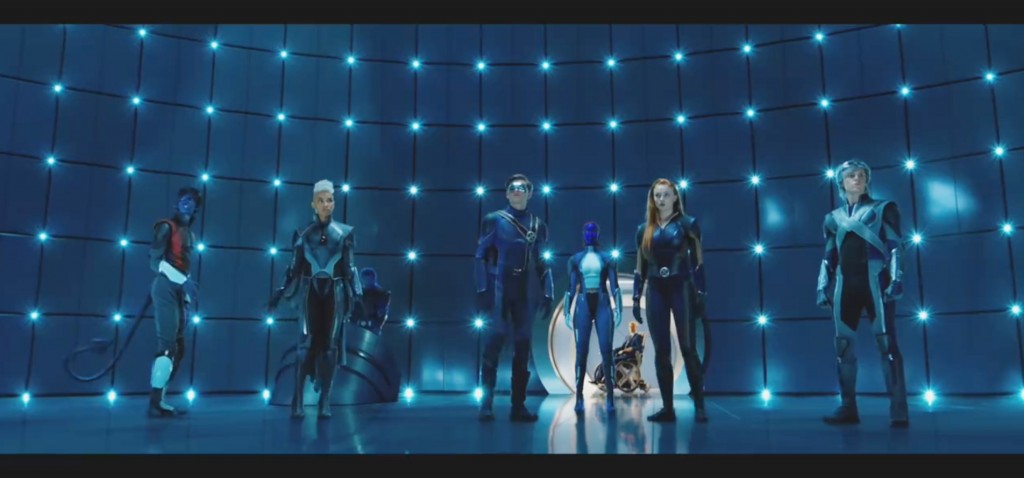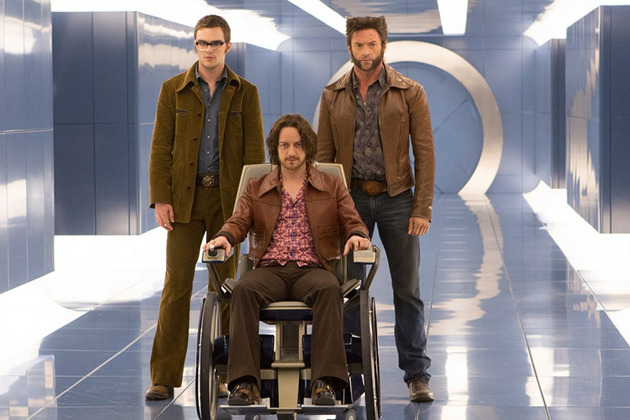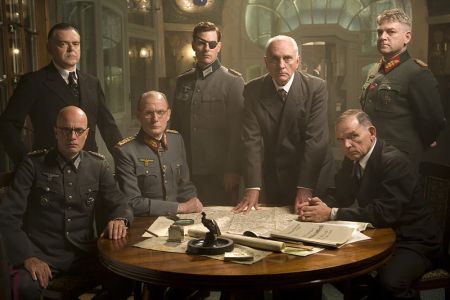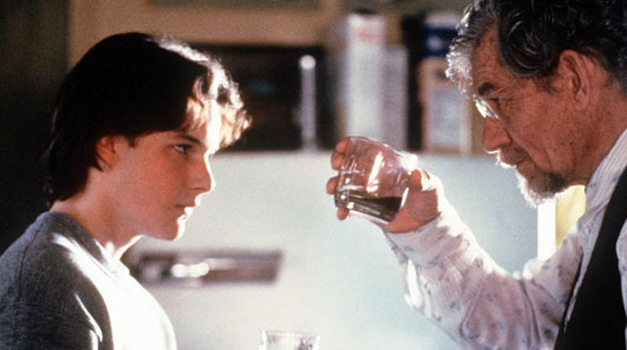X-Men: Apocalypse (2016)
CAST: James McAvoy, Michael Fassbender, Jennifer Lawrence, Nicholas Hoult, Rose Byrne, Oscar Isaac, Tye Sheridan, Sophie Turner, Kodi Smit-McPhee, Evan Peters, Lucas Till, Alexandra Shipp, Olivia Munn, Ben Hardy
REVIEW:
X-Men: Apocalypse is the fourth comic book superhero movie to arrive in theaters in the first five months of 2016 (preceded by Deadpool, Batman v Superman: Dawn of Justice, and Captain America: Civil War). With so many comic book movies churning out left and right these days, over-saturation is a growing concern, and Apocalypse doesn’t do anything to distinguish itself in a crowded field. In fact, it’s a disappointingly generic and muddled effort that, despite its attempts to up the ante, is a marked step down from its immediate predecessors X-Men: First Class and X-Men: Days of Future Past, nor is it as good as the original live-action X-Men movie or X2: X-Men United. It’s better than the prequel misfire X-Men Origins: Wolverine (no great accomplishment) but stands about even with X-Men: The Last Stand (though, in fairness, despite its ominous title, Apocalypse doesn’t massacre half the cast, so while as muddled and uneven as Last Stand, it’s not as aggravating). With Days of Future Past, returning series helmsman Bryan Singer (who directed and co-wrote 1 & 2) kept the fresh rejuvenating life Matthew Vaughn breathed into First Class going strong, but here, the rebooted series’ reclaimed energy and freshness is sputtering in fits and starts. Continue reading
X-Men: Days of Future Past (2014)
CAST: Hugh Jackman, James McAvoy, Michael Fassbender, Jennifer Lawrence, Patrick Stewart, Ian McKellen, Nicholas Hoult, Peter Dinklage, Halle Berry, Ellen Page, Shawn Ashmore
REVIEW:
Like some of the best comic book superhero movies (Nolan’s Batman trilogy, Captain America: The Winter Soldier, and its own predecessor X-Men: First Class), X-Men: Days of Future Past, taking its name and some plot elements from a well-known X-Men comic storyline, mixes things up and takes the genre in unconventional directions. The result is perhaps the strongest installment the X-Men film series has churned out yet, equaling or surpassing First Class.  Taking back his seat in the director’s chair from the likes of Gavin Hood and Matthew Vaughn, Bryan Singer has kept the fresh life First Class breathed into the floundering series going and taken it even further. Days of Future Past, as its quirky title suggests, does something very different with the familiar characters, but as with its aforementioned cinematic cousins, different’s not a bad thing, especially when more generic comic book films are churning out left and right these days. Continue reading
Taking back his seat in the director’s chair from the likes of Gavin Hood and Matthew Vaughn, Bryan Singer has kept the fresh life First Class breathed into the floundering series going and taken it even further. Days of Future Past, as its quirky title suggests, does something very different with the familiar characters, but as with its aforementioned cinematic cousins, different’s not a bad thing, especially when more generic comic book films are churning out left and right these days. Continue reading
Valkyrie (2008)
CAST:
Tom Cruise, Kenneth Branagh, Bill Nighy, Terence Stamp, Tom Wilkinson, Carice van Houten, Kevin McNally, David Schofield, Eddie Izzard, Jamie Parker, Thomas Kretschmann, Christian Berkel, Tom Hollander, David Bamber
REVIEW:
During his twelve-year reign, Adolf Hitler survived over forty known assassination attempts, at least fifteen of which were made by Germans. But the most hated man of the 20th century was also one of the most extraordinarily lucky. Something always managed to go wrong; Hitler would cut speeches or conferences short, avoiding timed bomb blasts, the explosives themselves would fail to detonate, and the forces arrayed against him often proved to be unfortunately uncoordinated and indecisive. The final, most famous, and most nearly successful attempt on Hitler’s life came on July 20, 1944, orchestrated by a group of rebel German military officers and politicians spearheaded by decorated injured war hero Colonel Count Claus von Stauffenberg. Continue reading
X-Men (2000)
DIRECTOR: Bryan Singer
CAST:
Hugh Jackman, Patrick Stewart, Ian McKellen, Anna Paquin, Halle Berry, Famke Janssen, James Marsden, Bruce Davison, Ray Park, Rebecca Romijn, Tyler Mane
REVIEW:
Since the X-Men comic book series was first introduced in the 1960s, it has been one of Marvel Comics’ most consistently popular titles. It had already been an animated television series, and it was inevitable that it would be made into a feature film sooner or later. Now that it has been done, its loyal fans are probably a little divided over it. Some will appreciate writer-director Bryan Singer’s faithfulness to the source material and his serious effort to transfer it from page to screen as intact as possible. But with any large following, it is impossible to please everyone, with the most minor alterations leaving some outraged. Personally, as someone who collected X-Men comics when younger, I approve of Singer’s respect for the mythos and characters, but it’s been too long since I’ve read the comics to even know most of what was changed or left out, and in any case it doesn’t bother me. A comic book series which carries on for decades and thus can include endless complex interweaving plotlines and a vast array of characters and a two-hour movie are different mediums. Singer keeps things simple and straightforward; one doesn’t need familiarity with the source material to understand and enjoy the film. X-Men is essentially comic book action-adventure fantasy escapism, but an embedded social message about overcoming fear and hatred lends it a touch of depth beyond just a summer action flick.
 The premise is that mankind has begun evolving into mutants with superhuman powers which cannot be explained or understood by the average person, and as such are largely feared and even hated. And among the mutants, battle lines have been drawn between two ideologically opposed groups. One is led by the psychic Professor Charles Xavier (the commanding Patrick Stewart, who even looks like the comic book character), who runs a school for ‘gifted students’ in New York, actually a place where mutant children can come and be taught to hone their powers in an accepting and encouraging environment. Xavier has hopes that mankind will come to accept mutants in time, and also uses the school as a cover for the secret base where he and his team of likeminded mutants try to counter the other, less benevolent group led by Xavier’s old friend Erik Lensherr/Magneto (Sir Ian McKellen). Embittered by his childhood experiences in Nazi concentration camps, Erik/Magneto has no faith in humanity and has come to view himself as superior to them. His disgust for mankind’s bigotry is only reinforced by the McCarthy-esque Senator Kelley (Bruce Davison), who incites fear of mutants and is pushing discriminatory legislation. Xavier’s team is made up of the telepathic Jean Grey (Famke Janssen), Cyclops (James Marsden), who shoots laser blasts from his eyes, and weather-controlling Storm (Halle Berry in a white wig). Newcomers to the group are Rogue (Anna Paquin), who drains the life force—and absorbs the powers—of anyone she touches with her bare skin, and the mysterious Wolverine (buffed-up Aussie newcomer Hugh Jackman, whose accent slips once or twice). Wolverine gets the most screentime of anyone, and has the most shadowy back-story; obviously the victim of extensive and horrific experimentation, he has had an indestructible metal grafted onto his entire skeleton, giving him the ability to grow metal spikes out of his hands. Magneto’s group includes the shape-shifting Mystique (an unrecognizable Rebecca Romijn), Toad (Ray Park, best-known as Darth Maul in Star Wars Episode I: The Phantom Menace) who has a nasty way with his tongue, and the hulking Sabertooth (professional wrestler Tyler Mane)…and they’re up to something. The loner Wolverine and the teenage runaway Rogue must decide whether to embrace Xavier’s offer of help—and his cause—or continue on their own.
The premise is that mankind has begun evolving into mutants with superhuman powers which cannot be explained or understood by the average person, and as such are largely feared and even hated. And among the mutants, battle lines have been drawn between two ideologically opposed groups. One is led by the psychic Professor Charles Xavier (the commanding Patrick Stewart, who even looks like the comic book character), who runs a school for ‘gifted students’ in New York, actually a place where mutant children can come and be taught to hone their powers in an accepting and encouraging environment. Xavier has hopes that mankind will come to accept mutants in time, and also uses the school as a cover for the secret base where he and his team of likeminded mutants try to counter the other, less benevolent group led by Xavier’s old friend Erik Lensherr/Magneto (Sir Ian McKellen). Embittered by his childhood experiences in Nazi concentration camps, Erik/Magneto has no faith in humanity and has come to view himself as superior to them. His disgust for mankind’s bigotry is only reinforced by the McCarthy-esque Senator Kelley (Bruce Davison), who incites fear of mutants and is pushing discriminatory legislation. Xavier’s team is made up of the telepathic Jean Grey (Famke Janssen), Cyclops (James Marsden), who shoots laser blasts from his eyes, and weather-controlling Storm (Halle Berry in a white wig). Newcomers to the group are Rogue (Anna Paquin), who drains the life force—and absorbs the powers—of anyone she touches with her bare skin, and the mysterious Wolverine (buffed-up Aussie newcomer Hugh Jackman, whose accent slips once or twice). Wolverine gets the most screentime of anyone, and has the most shadowy back-story; obviously the victim of extensive and horrific experimentation, he has had an indestructible metal grafted onto his entire skeleton, giving him the ability to grow metal spikes out of his hands. Magneto’s group includes the shape-shifting Mystique (an unrecognizable Rebecca Romijn), Toad (Ray Park, best-known as Darth Maul in Star Wars Episode I: The Phantom Menace) who has a nasty way with his tongue, and the hulking Sabertooth (professional wrestler Tyler Mane)…and they’re up to something. The loner Wolverine and the teenage runaway Rogue must decide whether to embrace Xavier’s offer of help—and his cause—or continue on their own.
X-Men should please most fans by showing off each character’s powers, but has received some criticism for focusing more on Wolverine, Magneto, and Rogue than anyone else. That may be a legitimate criticism (although the above three are a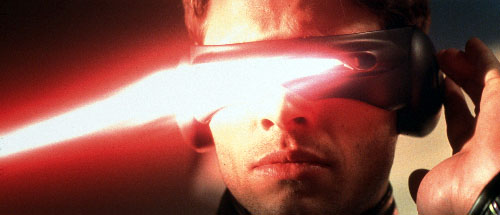 lso for my money the most three-dimensional and compelling characters), but it already has a large cast of characters and focusing on all of them equally would bog the movie down. As it is, it already spends almost half its running time on exposition and character introduction and development, which for the introductory outing may have been a necessary evil. With special effects-heavy action sequences and an undercurrent of humor, it is likely to entertain most theatergoers, and keeps the characters, their powers, and the plot easy to keep track of. X-Men’s tone, while occasionally hitting a surprisingly poignant moment, is fairly lightweight, and it focuses more on the origin aspect than the plot, which leads to an action-packed climax but keeps fairly modest goals. X-Men doesn’t aspire for the epic, and it lacks the ambition and scope of Superman, but it’s entertaining and fulfills what it sets out to accomplish. All of the actors do well enough in their roles, especially Ian McKellen, Hugh Jackman, Anna Paquin, and Patrick Stewart, but the others are not given too much to do.
lso for my money the most three-dimensional and compelling characters), but it already has a large cast of characters and focusing on all of them equally would bog the movie down. As it is, it already spends almost half its running time on exposition and character introduction and development, which for the introductory outing may have been a necessary evil. With special effects-heavy action sequences and an undercurrent of humor, it is likely to entertain most theatergoers, and keeps the characters, their powers, and the plot easy to keep track of. X-Men’s tone, while occasionally hitting a surprisingly poignant moment, is fairly lightweight, and it focuses more on the origin aspect than the plot, which leads to an action-packed climax but keeps fairly modest goals. X-Men doesn’t aspire for the epic, and it lacks the ambition and scope of Superman, but it’s entertaining and fulfills what it sets out to accomplish. All of the actors do well enough in their roles, especially Ian McKellen, Hugh Jackman, Anna Paquin, and Patrick Stewart, but the others are not given too much to do.
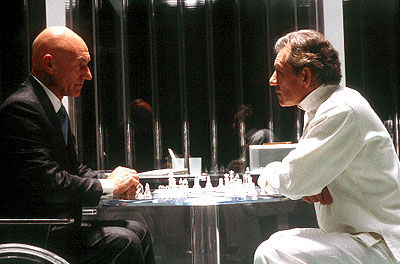 A few qualities raise X-Men above mere comic book escapism. One is the casting of Patrick Stewart and Ian McKellen, whose commanding and dignified presences bring a touch of class and grant the movie a little needed gravitas. Another, probably most significantly, is the underlying theme of tolerance and accepting differences which runs throughout the movie, never too overt or preachy to interfere with the action sequences and special effects, but never far under the surface either. The big brother-little sister type bond between the gruff but ultimately humane Wolverine and the lonely and alienated Rogue has a touch of depth, and Anna Paquin effectively projects the pain and loneliness of being cast out from society for being different. Hugh Jackman, an Aussie unknown in the States, is likely to launch himself into budding heartthrob status and embodies some trademarks of the comic character (he chomps on cigars and says “bub”). Jackman has the charisma to be as close to a main “star” as we have, though he’s also given the most central attention. Thus, while X-Men can simply be enjoyed for the action-adventure escapism it is, it, like the comic series, is fundamentally an allegory for the struggles of minorities facing discrimination and hatred, and the symbolism, both on the page and the screen, isn’t hard to see. Also adding complexity is the fact that while Magneto’s plan might be a little silly (it involves building a machine to transform all the world leaders gathered for a summit on Ellis Island into mutants) Magneto himself is not quite your standard issue comic book megalomaniac. He is a bitter and cynical man who has lived through the horrifying levels intolerance can reach and is resorting to extreme measures to protect himself and his people, and McKellen and the filmmakers portray Magneto as more misguided than evil, and more three-dimensional than the villains we typically expect to see in comic book movies.
A few qualities raise X-Men above mere comic book escapism. One is the casting of Patrick Stewart and Ian McKellen, whose commanding and dignified presences bring a touch of class and grant the movie a little needed gravitas. Another, probably most significantly, is the underlying theme of tolerance and accepting differences which runs throughout the movie, never too overt or preachy to interfere with the action sequences and special effects, but never far under the surface either. The big brother-little sister type bond between the gruff but ultimately humane Wolverine and the lonely and alienated Rogue has a touch of depth, and Anna Paquin effectively projects the pain and loneliness of being cast out from society for being different. Hugh Jackman, an Aussie unknown in the States, is likely to launch himself into budding heartthrob status and embodies some trademarks of the comic character (he chomps on cigars and says “bub”). Jackman has the charisma to be as close to a main “star” as we have, though he’s also given the most central attention. Thus, while X-Men can simply be enjoyed for the action-adventure escapism it is, it, like the comic series, is fundamentally an allegory for the struggles of minorities facing discrimination and hatred, and the symbolism, both on the page and the screen, isn’t hard to see. Also adding complexity is the fact that while Magneto’s plan might be a little silly (it involves building a machine to transform all the world leaders gathered for a summit on Ellis Island into mutants) Magneto himself is not quite your standard issue comic book megalomaniac. He is a bitter and cynical man who has lived through the horrifying levels intolerance can reach and is resorting to extreme measures to protect himself and his people, and McKellen and the filmmakers portray Magneto as more misguided than evil, and more three-dimensional than the villains we typically expect to see in comic book movies.
X-Men’s maintaining of the comics’ emphasis on the plight of minorities is unsurprising considering that its young writer-director, Bryan Singer, who made a name for himself with 1995’s The Usual Suspects, is both Jewish and gay (Singer also directed the far darker and disturbing Apt Pupil, which also featured Ian McKellen and Bruce Davison). Both Singer and the also openly gay Sir Ian McKellen have commented in interviews that the mutants’ struggle for acceptance striking a chord with their own backgrounds was what attracted them to the film. If embedding a message of tolerance inside an action-packed summer flick will get more people to hear it, so be it, although many will likely only be dazzled by the special effects and action scenes and not read between the lines to get the underlying point. In any case, whether you see it as a call for tolerance or entertainment or both, X-Men serves as solid escapist fantasy with an underlying message of acceptance and understanding that’s as relevant today as ever.
***
Apt Pupil (1998)
CAST: Brad Renfro, Ian McKellen, Bruce Davison, David Schwimmer, Joshua Jackson, Ann Dowd, Elias Koteas, Michael Byrne, Joe Morton, Jan Triska
REVIEW:
WARNING: THIS REVIEW WILL REVEAL “SPOILERS”
Apt Pupil is a morbidly engrossing psychological thriller crafted with enough professionalism and ability to sometimes persuade us to overlook its questionable taste, even if the bad aftertaste lingers. An adaptation of a novella by Stephen King (a previous attempt at filming it was mounted in 1988, starring Ricky Schroder and Nicol Williamson, but fell through), it uses that ever-convenient go-to-guy of villains—Nazis—as a launching pad for a psychological character study. Those seeking a conventional “thriller” might be disappointed. Apt Pupil is disturbing, sometimes chilling, but the horror is not of the “boo!” variety. Apt Pupil is a slow-burn foray into the heart of darkness that resides within two seemingly very different men, and how they feed each other’s worst impulses. Continue reading
